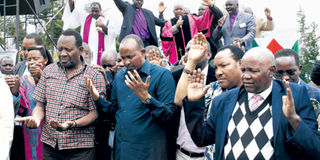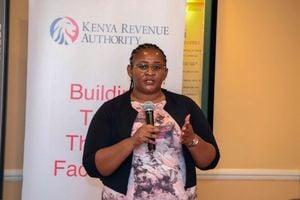ICC crisis: A united Kenyan leadership could win UN Security Council deferral

Jubilee leaders during a past prayer rally. PHOTO | NATION MEDIA GROUP
What you need to know:
- The centrepiece of the Court, for example, was that rulers could be brought to book, but that would also be its greatest challenge, since it was clear that leaders of major powers would obviously not be taken to an ICC trial.
- The ICC cases were also all too easily manipulated to convince many that they were a foreign plot to determine our political destiny, and Kenyans have paid a heavy price ever since, the killings of witnesses apart.
- The judges will determine their verdicts on the basis of the law and adduced evidence, and are not allowed to consider, nor are they competent to assess, the political consequences of conviction.
As a member of UN Secretary-General Kofi Annan’s strategic communication team, one of the issues that I was keenest on was a signature initiative of his – the formation of the International Criminal Court.
As he once said in 1997, only such a court could ensure “that no ruler, no state, no junta, and no army anywhere can abuse human rights with impunity.”
The end of the Cold War a few years earlier had seen wars between neighbours replaced by an explosion of multiplying internal conflicts seemingly without end, such as in Rwanda, Liberia and Sierra Leone. Something needed to be done, and the Court was an idea whose time had come – with Mr Annan’s assistance.
In time, I began like many others to see that this vital court would have unavoidable weaknesses and would only be able to create and retain its credibility by the most rigorous application of transparent norms.
The centrepiece of the Court, for example, was that rulers could be brought to book, but that would also be its greatest challenge, since it was clear that leaders of major powers would obviously not be taken to an ICC trial.
But that, therefore, did not mean that we should give up the effort to find a deterrence for ruthless leaders of smaller countries. There would still be the major problem in the Court’s ability to gather evidence against a ruler or someone in his inner circle who had committed crimes.
And even if such evidence did become accessible, there was the other question, of the Court’s “foreignness” – especially in countries, which like Kenya suffered disastrous colonial upheavals and have a strong animus against foreign intervention.
Following our post-election violence, most Kenyan leaders, as well as Justice Philip Waki and Kofi Annan, an architect of the court now turned the African Union mediator, were aware of these challenges and so sought a local-international tribunal instead. But there was little confidence among Kenyans in the Judiciary and so without any national debate whatsoever, the media-led “Don’t be Vague, Go to Hague” slogan, combined with some early governmental dysfunction, Kenya ended up with the ICC without ever formally deciding that this was what we wanted.
As we now know, Kenya followed the script that was feared. Since neither the President nor the Prime Minister were accused, there was a feeling that gathering evidence would not be impossible, especially after the Waki Commission and the Maina Kiai-led Kenya National Human Rights Commission, in acts of extra-ordinary courage, were able to document many of the crimes. But there were powerful-enough forces who were able to systematically murder or “disappear” witnesses or buy them out, or prevent the transmission to The Hague of other evidence being sought, as the two ICC prosecutors have documented.
The ICC cases were also all too easily manipulated to convince many that they were a foreign plot to determine our political destiny, and Kenyans have paid a heavy price ever since, the killings of witnesses apart.
But the potential of even greater costs looms if two Kalenjins, Deputy President William Ruto and broadcaster Joshua Sang, end up being the only ones convicted for the violence. As Sunday Nation columnist Mutiga Murithi argued last week, “an outcome which results in the conviction of only one alleged set of perpetrators will be problematic for the long-term prospects of peace and meaningful reconciliation in the Rift Valley”.
The whole power of the ICC cases in fact was that both sides involved in the killings were being prosecuted. That compact or equivalence has now been broken, and the search for justice for those who were killed or wounded or displaced is not possible at the ICC now.
Adding fuel to the current tensions is the incoherent but ethnically-divisive campaign to pin the blame for Mr Ruto’s ICC woes on opposition leaders, most notably Raila Odinga, by Gatundu South MP Moses Kuria, the volatile and destabilising figure who is repeatedly accused of incitement.
His latest actions are the most reckless, triggering widespread alarm, with ICC judges warning yesterday that the prayer rallies are hurting Mr Ruto. Last Sunday, even Mr Musalia Mudavadi, the most studiously restrained of our leaders, said that talk of who “fixed” Mr Ruto was raising the political temperature to a point of unmanageable levels. “This debate is a double-edged sword that can tear this country apart.”
Recognising that such politicised testimony would not influence the case’s outcome, some commentators have urged that the focus be on presenting the strongest defence, including intervention with the Assembly of State Parties on recanted testimony. But even that course of action provides no guarantee that acquittals will follow.
The judges will determine their verdicts on the basis of the law and adduced evidence, and are not allowed to consider, nor are they competent to assess, the political consequences of conviction.
There is only one course of action that, if successful, could ensure that we are spared a potential crisis: An appeal to the UN Security Council for deferral on the grounds that convicting only the Kalenjin for violence that engulfed the entire nation would endanger peace and security.
This suggestion might seem odd in light of the curt refusals of the Council to the previous requests, but an altogether new reality now prevails, both domestically and internationally, which holds out the prospect of success.
There were two sets of reasons why the deferral appeals in their earlier incarnations failed miserably. For one, their goal was patently linked to serving the interests of the accused — who were politically allied — rather than the interest of the nation or of peace. In addition, the ODM half of the coalition did not support the appeal.
Now, however, both sides of the aisle mostly favour terminating the Ruto case, including Raila, who has publicly stated he would go to bat for Mr Ruto at the ICC if the President also takes some steps.
The international dimensions of the appeal were also not at all favourable in the earlier period. Our partners had been quite outspoken in support of our struggle for the new Constitution, but the subsequent ICC-generated tensions and the coming election saw things go rapidly downhill.
No effort whatsoever had been undertaken to investigate the post-election crimes, and the ICC was routinely condemned, that combination putting out of question a deferral in the name of peace and security.
In addition, President Uhuru Kenyatta was isolated internationally in his run for the presidency given his ICC charges, but right after his election, he further inflamed matters with bitter attacks on the West. Other African presidents who supported Uhuru’s stand were similarly seen as being cynically opportunistic since many had sought the Court’s assistance in prosecuting opponents suspected of war crimes.
But Kenya is no longer a semi-pariah state internationally, and distressing as it was for some of us to see President Obama give unambiguous support for Uhuru and thereby remove any external pressure to improve democratic governance, and yet criticise the Opposition, the reality is that Kenya has a much more positive profile abroad (than internally).
In addition, President Obama agreed to be photographed with Mr Ruto, a normally unthinkable event. The US apart, the UK and Kenya have agreed to a major new defence arrangement, and France, Germany, Denmark and Japan, among others, are intensifying co-operation, and Western tourists are returning. Clearly, Western powers are determined to do what they can to buttress a country they see as a bulwark against terrorism and for regional stability.
Unlike its judges, the ICC is basically a political institution. For one, the UN Security Council enjoys a number of privileges in directing the Court’s work. For another, the overwhelming number of people charged by the ICC are those the West does not favour, such as Sudanese President Omar al Bashir and Cote d’Ivoire’s former president Laurent Gbagbo, the only African leaders currently indicted.
Others who have been threatened with ICC trials have been those such as Libya’s Gaddafi but not the Saudi Arabians who are daily raining destruction on Yemen’s civilians, not merely threatening it.
A September UN report documented horrendous civilian atrocities in Sri Lanka 10 times worse than Kenya’s when former President Mahenda Rajapaksa crushed the Tamil insurgents, but its recommendations were absurdly mild — since the new government is pro-Western.
Regrettable as such a reality is, the government should take advantage of it and seek a deferral from the Security Council. To have any chance of success, President Kenyatta should begin by reining in the inciters from his side, commit to abandoning democratically-restrictive policies and seek an arrangement with the CORD opposition for a deferral request to the Security Council.
Lone’s book on Kenya’s contemporary history will be published next year. He was the editor of former UN Secretary General Boutros Boutros-Ghali’s books on the Rwanda and Yugoslavia tribunals. He was spokesman for Mr Raila Odinga until 2012. [email protected]





